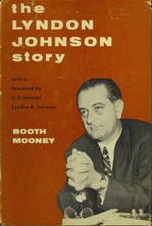 |
|
 |
|
 |
 |
 |
 |
 |
 |
 |
 |
 |
 |
| 2016 Election: | Hillary's book | Trump's book | Bernie's book | Ted Cruz's book | | | 2016 Senate Debates |
The Lyndon Johnson Story by Booth Mooney  (Click for Amazon book review)
BOOK REVIEW by OnTheIssues.org: This book was originally published in 1956, when Johnson was Senate Leader. It was then expanded upon in 1964, adding materials about his Vice Presidency and early Presidency. The author, Booth Mooney, was Johnson's executive assistant when Johnson was a Senator. However, the book is an "unauthorized biography," i.e. Johnson did not approve its content (the author and Johnson parted on "permanent" terms, p. xix), although Johnson wrote the foreword to the 1956 edition. This book is hence an insider's look at Johnson's years in the House of Representatives and the Senate, and a well-informed reporter's look at the White House years. The core question for modern readers of this book--and the core historical question of Johnson's presidency--is: "Why did Johnson invest so heavily in Vietnam?" While President Nixon takes a lot of heat for the Vietnam War, it was President Johnson who ratcheted up U.S. involvement, leaving Nixon with limited choices about how to get out. This book, written before Johnson's major decisions about escalating the American military presence in Vietnam, makes clear that Johnson's pro-war policy in Vietnam was not a policy unique to that country. He pushed for military action early in the Korean War (1950, p. 70); he pushed for "preparedness" for the Cold War prior to that (1949, p. 67); he pushed for maintaining military strength after WWII (1945, p. 52); and he pushed for military base construction prior to WWII (1940, p. 36). In that context, Vietnam was just another war that Johnson could push for more military preparedness and more military action--but with Johnson as President, Vietnam became a deep, long, and damaging enterprise. It is challenging for the modern reader to look beyond Vietnam, the elephant in the room in Johnson's story. But this book also shows how Johnson's legislative history laid the groundwork for Johnson's other presidential accomplishments. The Great Society was anticipated by Johnson's focus on rural development in Texas in the 1930s and 1940s (p. 33). The well-known Civil Rights Act of 1964 was preceded by the legislation that Johnson pushed as Senate Majority Leader, the Civil Rights Act of 1957 (p. 148). The space program, begun by Pres. Kennedy and culminating in the moon landing under Pres. Nixon only 6 months after Nixon took office, was urged by Johnson in the 1950s Senate and expanded under his presidency (p. 150) with little lasting credit. Modern politicians do not look back to Johnson as a positive example of anything. Modern Republicans sometimes bash Johnson's "War on Poverty" but modern Democrats attribute most entitlement programs to Franklin D. Roosevelt, who started them, rather than Johnson, who built them into their current organization. Modern Democrats routinely cite Pres. Kennedy as inspiration, even though Johnson implemented the visions that Kennedy laid out. Perhaps the most important lesson of this book is for future presidents to consider that, if they push for an unpopular war, their other accomplishments will be forever ignored by history. -- Jesse Gordon, OnTheIssues editor-in-chief, November 2012
by Booth Mooney. Error processing SSI file
| ||||||||||||||||||||||||||||||||||||||||||||||||||
| ||||||||||||||||||||||||||||||||||||||||||||||||||
Page last edited: Dec 22, 2018